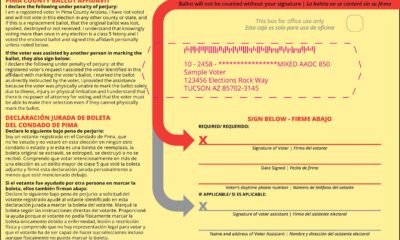Abe Hamadeh
Hamadeh Unveils Bill to Abolish Ranked Choice Voting Nationwide

By Matthew Holloway |
Arizona Republican Congressman Abe Hamadeh (R-AZ08) revealed on Monday that he will co-lead the Preventing Ranked Choice Corruption Act alongside Rep. Nick Begich (AK-At Large). The proposed legislation aims to amend the Help America Vote Act by prohibiting Ranked Choice Voting (RCV) nationwide, which Hamadeh describes as a “confusing and disenfranchising voting scheme.”
In his press release, Hamadeh criticized RCV, also known as instant-runoff voting, labeling it a “flawed process.” He argued that this method could enable a minority candidate to win when the majority party is divided among several preferred candidates. Voters rank candidates in order of preference, and if no candidate achieves a majority in the first round, votes are redistributed based on second choices until a majority winner is identified. This system eliminates the possibility of a plurality victory.
The text of the bill states, “A State may not carry out any election for Federal office using a system of ranked choice voting under which each voter ranks the candidates for the office in the order of the voter’s preference.”
Hamadeh expressed concerns about the motivations behind proponents of RCV, claiming they aim to “help corrupt politicians win” rather than assist American voters. He pointed to the influx of liberal funding attempting to influence Arizona’s electoral processes and maintained that residents reject RCV amid misleading campaigns.
Rep. Begich echoed these sentiments, emphasizing that the nation requires straightforward voting methods. He stated, “’One person, one vote’ is a proven method that is easy to understand, easy to audit, and quick to report. Experimenting with our national election systems risks disenfranchising voters and leads to results that don’t reflect the true will of the American people.”
Currently, Ranked Choice Voting is implemented in Alaska, a detail not lost on Begich, who has firsthand experience with its complications. His race underwent a second round even after he garnered 8,000 more votes than his opponent in the initial phase. Alaska narrowly retained RCV via Ballot Measure 2, defeating reform proposals by just 664 votes.
Hans von Spakovsky, a Senior Legal Fellow at the Heritage Foundation, has labeled RCV a “confusing, chaotic ‘reform.'” He cautioned that it alters the election process fundamentally, potentially disenfranchising voters and enabling the election of marginal candidates lacking majority support.
According to Spakovsky, RCV obscures the democratic process, disadvantaging voters by not allowing for a clear re-evaluation of the front-runners in a runoff situation and ultimately undermining informed decision-making.
Matthew Holloway is a senior reporter for AZ Free News. Follow him on X for updates or email tips to Matthew@azfreenews.com.

















